Workers Of Iran’s Razi Petrochemical Complex Join Nationwide Strikes
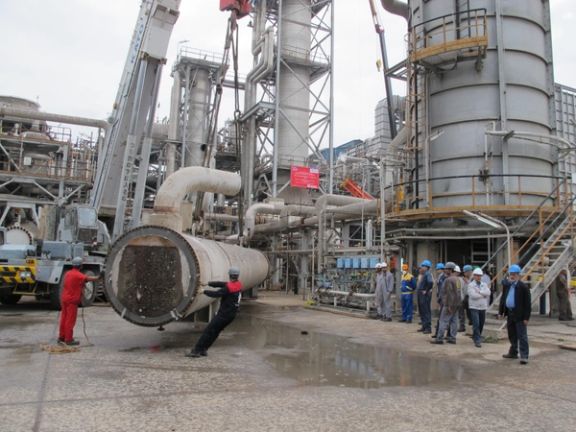
Workers at Razi Petrochemical Complex in the southern port city of Mahshahr stopped working and joined the strike campaign in other energy and steel plants.

Workers at Razi Petrochemical Complex in the southern port city of Mahshahr stopped working and joined the strike campaign in other energy and steel plants.
Reports on social media say the workers went on strike on Sunday demanding a 79% wage increase for the current year.
The plant began operations in 1968 to produce Ammonia, Urea, Phosphoric Acid, Sulphuric Acid, etc. It is also the largest fertilizer producer in Iran.
In 2020, Ali Akbar Ahmadi Dashti, CEO of the company was arrested on charges of financial corruption and a 330,000 USD embezzlement.
Workers in more than 80 companies, including steel workers, across the country joined industrial action, protesting poor working conditions, low wages and rising costs of living, the Council for Organizing Oil Contract-Workers' Protests said April 25.
On Friday, a regime official said four thousand striking energy workers in the energy and petrochemical sectors are being replaced.
In recent years, as the Iranian National Oil Company has ceded many operations to quasi-private companies, most of the work is done by temporary contract workers with little pay and no benefits.
The so-called private companies are controlled by the military or other state entities, or by well-connected regime insiders who quash labor demands by using government security forces.
Labor activists warn that society is on the verge of explosion as strikes reach expand. Experts say there is no end in sight as tensions rise amidst a crumbling economy and the biggest anti-regime sentiment in years.
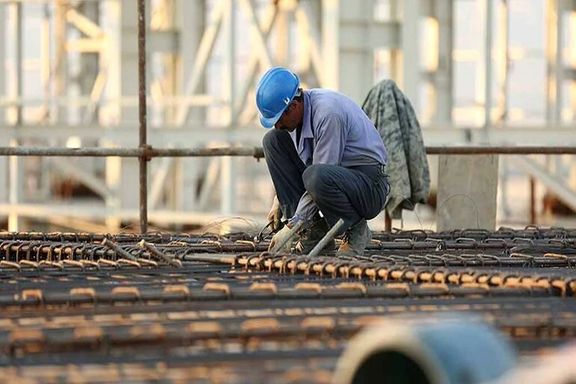
Three prominent Iranian labor activists condemned the recent detention of workers calling it an "organized brutality" by the regime.
Reacting to the recent arrest of a group of labor and union activists, Hassan Saeedi, Keyvan Mohtadi and Reza Shahabi, members of the Workers Syndicate of Tehran and Suburbs Bus Company (Sherkat-e Vahed), who are imprisoned in the notorious Evin prison, slammed the regime's suppression tactics on the eve of May Day, the international labor day.
They said the security agencies, which do not even respect people's privacy, resort to terror instead of dealing with the problems and resolving them.
"Ignorant of the fact that the people are alert, and bullying will not be tolerated by any part of society, [regime repressions] will only lead to more unity among the protesters," they underlined.
They also called on all trade unions, labor, social and political activists, as well as all the freedom seekers not to remain silent in the face of suppression, and to challenge the brutality of the security apparatus by any means possible.
On Friday, a group of labor activists, who went to visit the family of the imprisoned teacher, Mohammad Habibi, were violently attacked by security agents and arrested.
According to the statement, one of the teachers suffered a heart attack and nine others were taken to Evin prison with some in solitary confinement.
In recent days, a new wave of labor strikes have swept the country, with workers from more than 100 companies and plants involved in the protest movement.
An official at South Pars gas field on the Persian Gulf stated that 4,000 protesting workers will be replaced by new ones.
The Islamic Republic has kept accusing the protesting workers of being encouraged by foreign "enemies".
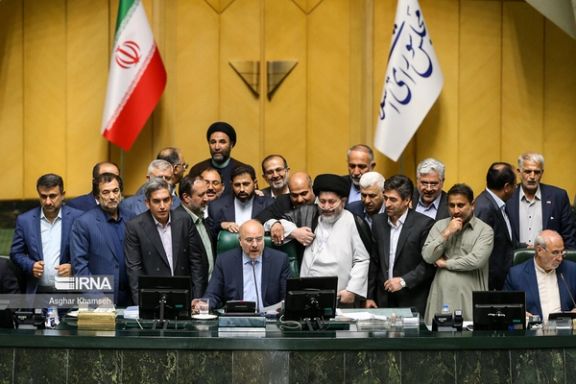
Iran’s parliament impeached industry minister Reza Fatemi-Amin Sunday for the current economic crisis, despite a direct intervention by President Ebrahim Raisi.
The session lasting more than six hours was marked by attacks from his opponents, Raisi’s speech and Fatemi-Amin’s own defense of his performance.
Statements by lawmakers as well as Raisi and his minister was a classic show that revealed some of the regime’s behavior in attributing serious issues to the shortcomings of individual officials rather than systemic problems in Iran’s governance.
The most remarkable revelation was not what critics said, but what Raisi and Fatemi-Amin admitted to be the existence of a “car mafia” in the country that dictates policy and prevents imports of decent passenger vehicles at normal prices, producing sub-standard and expensive local vehicles.
For years critics and politicians have criticized the government-controlled auto industry and have referred to a “mafia” running the money-losing and inefficient sector, largely owned by the government.
In 2019, it was revealed that carmakers owed $9 billion, a considerable sum in Iran, due to corruption and mismanagement.
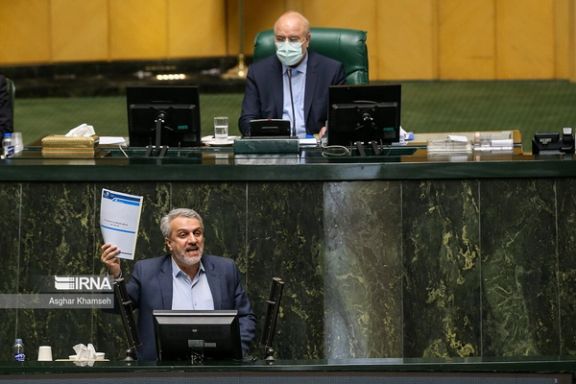
However, lawmakers held Fatemi-Amin responsible for rising car prices, instead of criticizing lack of competition, the centrally-run economy that leads to political interference and the falling Iranian currency, which has led to a higher than 50-percent annual inflation rate.
To be certain, Fatemi-Amin is just an average Islamic Republic official, who would not be capable of improving the fundamentals of the country’s mismanaged economy, even if he were a business and economic genius.
But at the dangerous juncture of a deepening economic crisis and approaching parliamentary elections in ten months, it seems that someone had to be held responsible, even by a parliament stacked with hardliners who initially supported Raisi’s government.
The Iranian rial has again began to fall against the US dollar and other major currencies, dropping to near 550,000 to the dollar on Sunday. This can only mean more inflation, while tens of millions of people have already become impoverished since 2018 when the United States imposed economic sanctions to force Iran to make concessions in its nuclear and military programs.
Recent allegations that Fatemi-Amin gave out 70 SUV vehicles to lawmakers to prevent their first attempt at collecting sufficient signatures for his impeachment, was the last blow that sealed his fate.
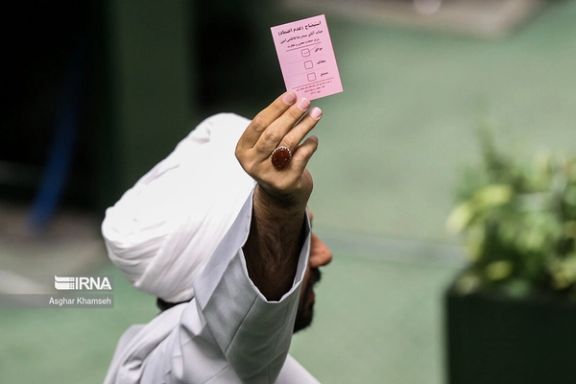
In his speech, the minister claimed that the “car mafia” spent money to discredit him, and even unknown assailants attacked and beat up his deputy, without the judiciary seriously following up on the incident.
He claimed that the “car mafia” had ways to prevent him from lowering vehicle prices. However, one lawmaker responded that if the minister is the people’s representative, why the “car mafia” has gone to great lengths recently to pressure members of parliament and prevent his impeachment.
Fatemi-Amin and some of his supporters in parliament also mentioned US sanctions as a an important reason for the disarray in the car industry. Until now, most hardliner lawmakers and their allies in the government had been arguing that sanctions have little impact and the Islamic Republic could stand on its own feet and strengthen the economy.
No regime insiders and few other politicians in Iran dare to speak about the need to reach an agreement with the United States, lift the sanction and alleviate the situation. It seems to be clear to most that the nuclear and diplomatic policies are decided at the higher level of Supreme Leader Ali Khamenei and it is expected from officials to muddle through.
The hard-pressed population can protest, as they have been doing since September, but the regime has no reservation about using deadly force to keep itself in power. Security forces have killed more than 500 civilians in recent months and arrested around 22,000 protesters and dissidents.
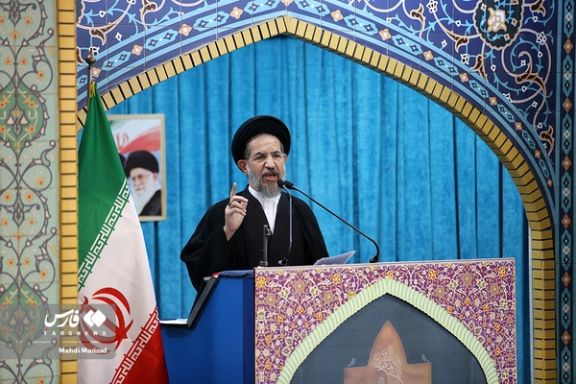
With no prospect of controlling Iran’s economic crisis, even high-ranking clerics representing Supreme the Leader have begun speaking out and demanding solutions.
Friday Prayers Imams in some major cities expressed their unhappiness over the government's performance, similar to criticism by many conservatives who backed President Ebrahim Raisi’s election less than two years ago.
Hashem Hosseini Bushehri, the Friday Prayers Imam of Qom, the venue of the country's most important seminary said in his sermon on Friday: "State officials spend most of their time in meetings with unknown results." He suggested that "Decisions made in those meetings should be followed up seriously by executive officials."
Referring to the declining value of Iran’s currency, he said, "The government's monetary policies should not change constantly. Some investors say they cannot count on the government's monetary regulations even for one day as things might change."
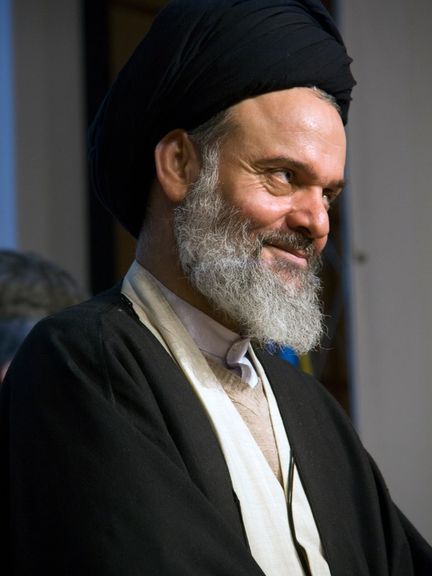
Bushehri also echoed Ali Khamenei’s recent remarks criticizing discord among the executive, legislative and judiciary bodies.
Friday Prayer Imams are appointees of the Supreme Leader and often reinforce his messages. Their demand for economic improvement can be seen as a sign that Khamenei’s patience is running out, as high inflation can trigger more protests.
Without mentioning the ongoing strikes and protests in the country's industrial centers, Bushehri called on the government on the occasion of Labor Day to find legal ways to help Iranian workers.
While inflation has topped 50 percent and the rial has halved in value, workers’ monthly salaries hover around $120-150. In the past ten days workers at more than 100 companies and plants went on strike.
Bushehri also called for "a competitive parliamentary election, so that the enemies will not be able to talk sarcastically about low turnout in Iranian elections."
The temporary Friday Prayers Imam of Mashhad, another religious city in Iran, Mohammad Bagher Farzaneh, who was standing in for the firebrand cleric Ahmad Alamolhoda criticized the government for the worsening situation and said: "Economic problems cannot be concealed."
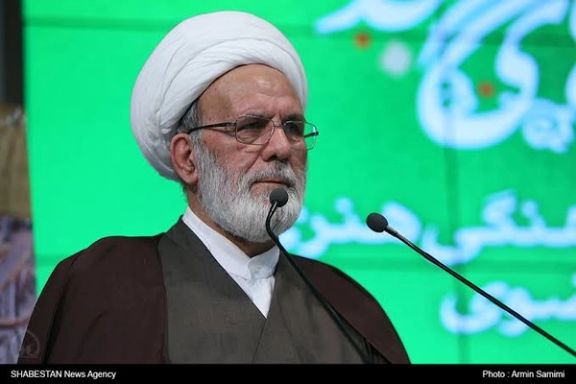
He said more than 51 percent of Iranians in big cities do not own a home and inflation has impoverished ordinary people.
However, also echoing Khamenei he said that the "economic problems can be solved if officials stand united, obey the Supreme Leader and have sympathy for each other." He added that it was a shame that 43 years after the Islamic revolution, the country's leader has to point out discords among the heads of the three powers of the government.
Recently, Ghasem Saedi, a senior lawmaker from Khouzestan Province had said that "The government has ruined the country's economic security," and warned the government that it cannot protect its credibility by chanting meaningless slogans.
In another part of his sermons, Farzaneh said: "Today, no one can claim that the United States does not have any infiltrators in Iran." He said that infiltrators are the main element behind the discord among the country's officials, without saying which high-ranking official in the government is a US infiltrator.
Meanwhile, the Friday Prayer Imam of Tehran, Hassan Aboutorabi-Fard, the only Imam with some executive experience under former President Mahmoud Ahmadinejad, also criticized the government for making economic decisions without thinking about the consequences and without considering the financial resources needed for implementing those decisions.
Aboutorabi-Fard warned the country's "rulers and managers" that their performance will inevitably affect all aspects of people’s life.
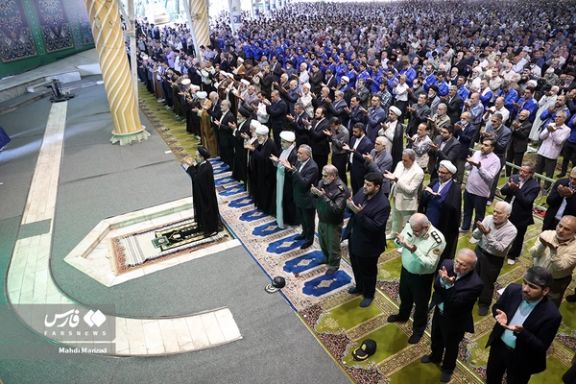
However, it was interesting that he also warned the government that measures to enforce hijab should be taken in a way to boost national unity rather than creating discord among the people and the government.
In recent weeks, as more women have defied the regime’s dress code and appear in public without a veil, hardliners in the government have been pushing for more enforcement measures.
Already, harsh policies against women triggered major nationwide protests leading to more than 500 deaths.
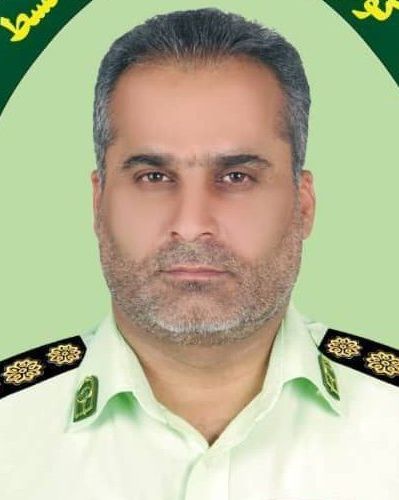
Armed attackers Sunday killed the chief of police Criminal Investigation Department for Saravan County in Iran's Sistan -Baluchistan province.
Nour News, affiliated with the Supreme National Security Council (SNSC), reported that unknown gunmen fired at the car of Major Alireza Shahraki.
The officer's wife was also severely wounded in the attack and taken to hospital in critical condition. Judiciary officials say no one has been detained yet but a manhunt is underway to arrest the perpetrators.
Halvash website that covers Baluchestan events reported that Shahraki used "extremely violent" methods against detainees in the past years.
Earlier in March, two other police officers were gunned down in the restive province with a Sunni-majority population. The attack occurred in a region called Golshan.
Local media identified the two officers as Mohsen Pudinei and Ehsan Shahraki who were shot "while carrying out a security mission regarding Friday prayers".
Last week, tensions built up in Fanuj in the same province after regime forces ran over two motorcycles with their vehicles killing a young man.
The outraged local population took to the streets to protest the actions of the repressive forces in the province. Local media reported that police opened fire at the protesters.
In recent months, pressure on the people in Sistan-Baluchistan has increased, and the situation in various cities has been described as very tense, especially on Fridays, when residents come out to protest against the regime.
The protests began on September 30, 2022, after nationwide unrest broke out following the death of Mahsa Amini.
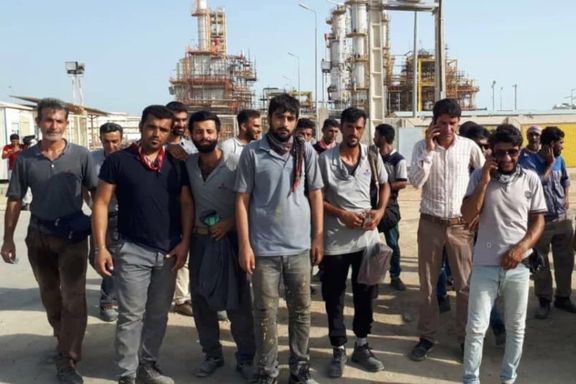
Amid widespread labor protests in Iran, an official says the monthly minimum wage of less than $200 only suffices for "nine days of a family's life".
Hossein Rasouli, an official from the Workers’ House said Saturday that currently, the minimum monthly wage of workers does not even reach eighty million rials (150 USD).
Although the government mandated wage is called the "minimum" wage but that is what most workers receive.
“The wages of the workers have increased by only 27% this year, but this increase is for those workers who are formally employed and does not include a large part of [temporary or contract] workers,” he underlined.
Earlier, the Coordinating Council of Teachers Associations said to prevent further impoverishment of the lower-class wages must be determined in US dollars.
Real incomes in Iran began to lag behind inflation after the establishment of the Islamic Republic in 1979, but salaries were increasing from 2000-2010 when monthly minimum wage hit a high of about $275 in 2010. This coincided with the time when the United Nations Security Council began imposing sanctions to force Tehran to roll back its nuclear program.
A few months into the presidency of Ebrahim Raisi, when inflation was around 40 percent, the High Council of Labor increased the minimum wage by an unprecedented 57 percent in early 2022 after two consecutive years of very high inflation. At the time minimum wage almost equaled $220.
However, the rial lost half of its value in the past 8 months and the minimum wage, without housing allowance, has dropped to around $120 a month.
Rising prices and declining incomes have led to more protests in the previous months with thousands of workers still on strike.